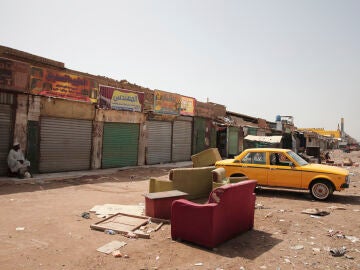
Clashes between the Sudanese Army and the paramilitaries do not stop in Khartoum despite the truces. He has lived there for four years. Miguel, a young man from Madrid who recounts the tense situation who lives in the capital of the African country, with a Spanish community of barely 80 people and where the Embassy has closed for security reasons. “Waking up to machine guns, planes and artillery is not easy“, he tells laSexta.
The streets, he explains, are generally empty, but “there are different points where there are armed forces” and fighting: the center of his own neighborhood, he explains, is “more or less safe”, but at the ends there are fights street. It is in the area of the city that brings together embassies and NGO offices where “there is much more fuss”: there, he points out, there are army and paramilitary barracks, “lots of artillery” and “fights down the street”. Another of the hot spots, he points out, is the area of the Republican Palace.
The noise of these street fights is heard from the houses, alerting the civilians not to leave their homes: “You hear where the fighting is and you don’t leave the house at that moment“, details Miguel, who specifies that “if people go out it is to go buy bread or a kilo of sugar or whatever they can and they return directly home.”
Added to the danger of dying in the crossfire is another, according to the young Spaniard: “Many times there are people who take advantage of the situationdresses as a military man or as a member of the Rapid Support Forces (FAR) and going to steal to people or to harm people”, he narrates, indicating that “sometimes there are desperate soldiers looking for food”.
A climate -he acknowledges- of “a lot of tension” that “affects mental health”: “For now we are positive, we remain strong, activated with the hope that this will end soon…”, affirms the young man, who nevertheless admits that it affects waking up every day to the sound of armed struggle. This, in the face of a conflict that in a matter of days has already killed some 270 civilians and left thousands injured, according to WHO figures, and that, according to Miguel fears, “it can take a long time”.
Source: Lasexta
Ricardo is a renowned author and journalist, known for his exceptional writing on top-news stories. He currently works as a writer at the 247 News Agency, where he is known for his ability to deliver breaking news and insightful analysis on the most pressing issues of the day.












